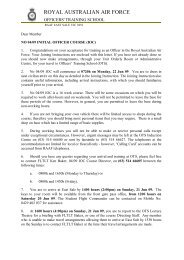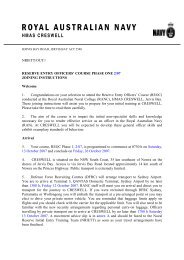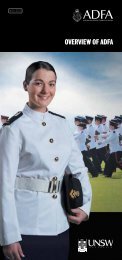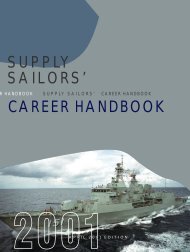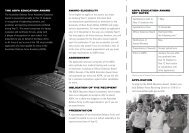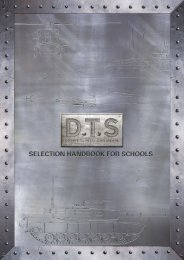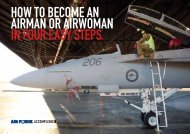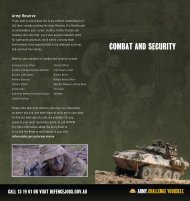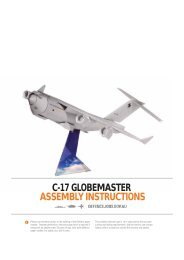A Guide For parents And Guardians - Defence Jobs
A Guide For parents And Guardians - Defence Jobs
A Guide For parents And Guardians - Defence Jobs
- No tags were found...
Create successful ePaper yourself
Turn your PDF publications into a flip-book with our unique Google optimized e-Paper software.
IntroductionDear Parents,This guide is designed to assist you in finding the information you needto help your son or daughter make a decision about a career in theAustralian <strong>Defence</strong> <strong>For</strong>ce.You will hear directly from the <strong>parents</strong> of current Midshipmen and OfficerCadets, as well as gain insights into life at the Academy – its benefits,challenges and rewards.As Chief of the <strong>Defence</strong> <strong>For</strong>ce my priority is the welfare of the peopleserving in and supporting the Navy, Army and Air <strong>For</strong>ce. I appreciate thevital role you play in supporting your children, and look forward to gettingto know you better during your son or daughter’s time in the Australian<strong>Defence</strong> <strong>For</strong>ce.I hope that you find this guide useful in helping your son or daughtermake this important decision.Angus Houston, AO, AFCAir Chief MarshalChief of the <strong>Defence</strong> <strong>For</strong>ce
Message from the Commandant of theAustralian <strong>Defence</strong> <strong>For</strong>ce AcademyThe Australian <strong>Defence</strong> <strong>For</strong>ce Academy (ADFA) is an education andtraining institution which offers young men and women the opportunityto pursue a degree through the University of New South Wales, andbegin a career in the Australian <strong>Defence</strong> <strong>For</strong>ce (ADF).At ADFA our intention is to provide Midshipmen and Officer Cadetswith an exciting, rewarding and challenging experience in a supportiveenvironment where they will have the opportunity, and be encouraged,to excel. The university degree and military training that youngAustralians undertake at ADFA, will give them an excellent basis for afuture leadership role and open up a wide range of career opportunities.A major emphasis of life at ADFA is on university studies. ADFA maintainsa very high standard of teaching with lecturers and tutors at the top oftheir relevant fields, one of the best student to teacher ratios in the countryand access to outstanding resources and facilities on campus. The othervery important emphasis is on military training and education, to providecadets with the fundamental knowledge, skills, professional abilities andqualities of character and leadership that are appropriate to officers inthe Australian <strong>Defence</strong> <strong>For</strong>ce.My first priority is our people, and we provide a skilled network ofacademic and military staff to support cadets at ADFA in all aspectsof their education and training. I’m proud of the professionalism,integrity, leadership and camaraderie demonstrated by our cadets,and I am committed to empowering them to be the leaders of the future.Air Commodore Margaret StaibCommandantAustralian <strong>Defence</strong> <strong>For</strong>ce AcademyAUSTRALIAN DEFENCE FORCE ACADEMYOur PurposeTo serve Australia by providing the Australian <strong>Defence</strong> <strong>For</strong>ce withtertiary graduates who have the foundational attributes, intellectand skills required of an officer.Our MissionTraining the future leaders of the Australian <strong>Defence</strong> <strong>For</strong>ce.
The Role of the Australian <strong>Defence</strong> <strong>For</strong>ceThe Australian <strong>Defence</strong> <strong>For</strong>ce (ADF) is a military body which includesthe Royal Australian Navy, Australian Regular Army and Royal AustralianAir <strong>For</strong>ce. These three Services are supported by the Department of<strong>Defence</strong> and by <strong>Defence</strong> Industry.The ADF mission is to defend Australia and its national interests. To achievethis, the ADF aims to be a balanced, networked and deployable force,manned by dedicated and professional people, which excels at joint andcoalition operations.The <strong>Defence</strong> values of professionalism, loyalty, integrity, courage,innovation and teamwork underpin everything we do. We expect ourmembers to demonstrate these values, and we support, skill and empowerthem to strive for excellence, work together and actively look for betterways of fulfilling our mission.The ADF plays a significant role in peacekeeping and humanitarianoperations around the world. It performs a vital role in Australiaperforming tasks such as:• reconnaissance, damage assessment, restoration of vital servicesand distribution of food and medical aid following natural disasters;• deterring and apprehending illegal fishing boats and persons involvedin illegal immigration and smuggling in our northern waters; and• providing a wide range of support to emergency and communityprojects, such as repairing infrastructure including housing, sewerage,roads and waste facilities in remote Aboriginal communities.<strong>And</strong> in the global community, including:• life saving aero-medical evacuations and distribution of humanitariansupplies to remote villages and communities;• playing an important part in the Australian Government’s internationalhumanitarian relief efforts;• helping turn around civil unrest and violence in the Solomon Islands as partof the Australian-led Regional Assistance Mission to the Solomon Islands;• securing key infrastructure, repatriating hundreds of Australians,confiscating hundreds of weapons and assisting in the provisionof humanitarian aid in Timor Leste in 2006; and• contributing to the rehabilitation and reconstruction of Iraq.
UNIVERSITY OF NEW SOUTH WALESThe University of New South Wales (UNSW) is one of Australia’s mostrespected universities, with an international reputation for outstandingacademic programs and world class research outcomes. UNSW@ADFA, our Canberra campus comprises of five academic schools,offering undergraduate and postgraduate qualifications in a wide rangeof disciplines.Cadets at ADFA are also undergraduate students of UNSW. When theygraduate from UNSW@ADFA at the completion of their three or fouryear undergraduate program, they do so with a fully recognised degreefrom UNSW–the same as the degree received by graduates of UNSW’scampus in Sydney.Detailed information on each of the undergraduate degrees offeredby UNSW@ADFA can be found in the ADFA Undergraduate <strong>Guide</strong>,available from Student Administrative Services, or fromwww.unsw.adfa.edu.au or for specific academic enquiries emailsas@adfa.edu.auGRADUATIONTo graduate from ADFA, cadets must achieve or demonstrate:• officer qualities, as embodied by the ADFA values of teamwork,honesty, integrity, courage and a sense of giving everyone a fair go;• successful completion of the Academy Military Education andTraining Program;• successful completion of Single Service Training; and• successful completion of an undergraduate degree.ADFA applies equal weighting to each of these components. Graduationfrom ADFA is dependent on cadets achieving all four components duringthree years of training.At the discretion of their Service, cadets studying a four yearundergraduate degree or who intend to undertake an honours yearmay return to ADFA following graduation to complete their studies andgraduate from UNSW.In addition, UNSW’s academic staff are some of Australia’s bestqualified in their respective fields and foster high quality learningoutcomes. As such, students can be assured that their UNSW degreeis of the highest standing.
LIFE AS A CADET
WHAT ADFA IS LOOKING FOR FROM YOUR SONOR DAUGHTERWhen we select individuals for admission into ADFA, we are looking fora range of qualities, academic and otherwise, which demonstrate theirability to further develop and enhance the skills and attributes whichwill enable them to be effective leaders within the Australian <strong>Defence</strong><strong>For</strong>ce. These are often referred to as officer qualities.There is no doubt that gaining entry into ADFA is competitive.To successfully complete the selection process, candidates mustsatisfy a number of military and academic requirements over a periodof six to twelve months.The first stage of joining the Navy, Army or Air <strong>For</strong>ce is to make anenquiry via the <strong>Defence</strong>jobs website or by calling 13 19 01. Staff willtake your son or daughter’s details, send them general informationquestions they can contact <strong>Defence</strong>jobs again or book aninformation session.As part of the application process your son or daughter will take anaptitude test to determine what particular roles they are best suited for.Your son or daughter will be provided with information on the range ofcareers that are available to them, and will discuss career opportunitieswith an ADF Careers Counsellor. By this stage they will have all of theinformation needed to decide what careers within the ADF best suittheir interests and particular abilities.The next steps include completing a medical questionnaire andassessment, a psychological interview, and a <strong>Defence</strong> interview.The purpose of these assessments is to ensure that your son ordaughter has the knowledge required, and is fully prepared for,an exciting and challenging career within the Navy, Army or Air <strong>For</strong>ce.On completing these assessments your son or daughter will be advised ifthey have been recommended to proceed to an Officer Selection Board fortheir preferred career role within the Navy, Army or Air <strong>For</strong>ce. If they havenot been recommended to proceed they may be provided with alternatecareer options or advised to return once they are better prepared.A UNIQUE ENVIRONMENTADFA provides an environment that welcomes students from a range ofoverseas defence forces, as well as mature age in-service candidates.This environment allows your son or daughter to learn from people froma diverse range of backgrounds and experiences.on joining and provide brochures about careers within the Navy,Army or Air <strong>For</strong>ce and about ADFA. If your son or daughter has further
OFFICER SELECTION BOARDIf your son or daughter has been recommended to attend an OfficerSelection Board for ADFA entry they will be invited to attend a four-daytrip to Canberra, where the Selection Boards are held. This trip includesa familiarisation tour of ADFA, a tour of Canberra, and participation inpersonal development and leadership workshops. The Officer SelectionBoards are held during the March/April, June/July and September/October school holidays.The Officer Selection Board consists of a series of activities designedto test aspects such as leadership skills, teamwork and individualabilities critical to the role your son or daughter has applied for.They will undergo a formal interview before a panel of officers and apsychologist, as well as participate in a range of challenging problemsolving exercises designed to test their competitiveness for availablevacancies. Army candidates may also participate in a formal leadershipexercise. They may also undergo a Physical Fitness Assessment (PFA).The PFA comprises a range of activities, depending on the Serviceyour son or daughter has chosen to join. Your son or daughter must becapable of achieving and maintaining a sufficient level of fitness to safelycommence training. This assessment must be passed at some timeduring the eight weeks prior to enlistment.Following the Officer Selection Board your son or daughter will beadvised in writing if they have been recommended or not recommendedto proceed. If they have not been recommended they may be providedwith alternate career options or advised to return once they are betterprepared. In some instances they will be placed in competition withother applicants and notified of their success at a later date. If they havebeen recommended, successful acceptance into ADFA is then dependenton their final Year 12 results and successful admission into UNSW.PILOT OFFICER CANDIDATESCandidates wishing to become pilots in the ADF will undergo a separatecentralised selection board process at Tamworth NSW. This process willassess your son or daughter’s suitability as both an officer and ADF pilot.These selection boards are run predominantly during school holidays.<strong>For</strong> more information on pilot selection visit www.defencejobs.gov.auA SUCCESSFUL APPLICATIONIf your son or daughter has been recommended at their Officer SelectionBoard they will need to submit an application to the UniversitiesAdmission Centre (UAC) in NSW, listing UNSW@ADFA degree as theirfirst preference. Confirmation of meeting the admissions requirementsto study at UNSW@ADFA is advised separately by an offer from UACin early January.As well as gaining the required University Admissions Index (UAI) orequivalent entrance score, some degrees assume students have studiedcertain subjects or met specific knowledge requirements in Years 11 and 12.UNSW@ADFA admission requirements are clearly outlined in the ADFAUndergraduate <strong>Guide</strong>. This guide is available directly from ADFA or viathe UNSW@ADFA website at www.unsw.adfa.edu.auIf your son or daughter is successful at an Officer Selection Board andmeets the admission requirements for UNSW@ADFA, they will becontacted by an ADF Careers Counsellor and sent a letter of offer.They will need to advise of their intent to accept the offer prior to theirappointment, and will then receive further information about joining ADFA.Applicants who are unsuccessful in competition with other candidateswill also be advised in writing.<strong>For</strong> further information regarding the application process or life at ADFA,please visit www.defencejobs.gov.au
Hear from <strong>parents</strong> of currentADFA cadetsIn developing this guide we went directly to the people who know bestwhen it comes to a son or daughter joining the ADF and in particularstudying at ADFA. We contacted a range of <strong>parents</strong> and asked them to tellyou a little bit about their experiences with ADFA.Here is some of what they had to say:Like all <strong>parents</strong> Kim Buckland played a big part in his daughter Amanda’sdecision to attend ADFA and join the Royal Australian Navy, although acareer with the ADF was not something he had thought his daughter wouldpursue. “In terms of priority, had you asked me four years ago what careerwould have best suited my daughter, without question a career with theADF would have been very much down the list. Four years later I could notthink of a more suitable, challenging and rewarding career for my daughter.Any concerns I had in the early days were based almost entirely onperception rather than on the facts. In my opinion the students at ADFAface a similar level or degree of challenges shared by many facets ofour society in the formative developmental years. Any undue challengesthey face by having a military/academic balance in their time at ADFA issurely compensated by the certainty and security of their future with theADF, not to mention the comradeship, as opposed to those undergoingpurely university studies with little or, more often, no security whatsoeverregarding their future employment.If the parent is confident in the son or daughter’s ability to do so, I couldthink of few better careers than the ADF and more specifically a careerachieved by attending ADFA”.This level of support is also shared by other <strong>parents</strong>. When asked howhe felt about his daughter Hailey’s choice to join the Army, John Fletchercommented that, “we are very proud that she is serving her country, andfollowing her chosen path”.“We are apprehensive about possible future assignments in dangerouslocations and a little worried about not seeing her much in the futurebecause of the likelihood of her being based interstate or overseas, however,we believe she has the potential for a long-term career as an officer in theADF. She’s expressed an interest in a couple of different areas and her choicewill become clearer as her military and academic training progresses.The students at ADFA have to balance academic studies, military studiesand training, sporting commitments and organised social activities sotime management is a major issue. Another challenge is dealing withso much change all at the same time–from family home to independentliving, settling into a new city, making new friends and learning new skills.Although our daughter was very independent for her age when she enteredADFA, she now seems much more confident and self-reliant.The advice I would offer to other families whose son or daughter isconsidering coming to ADFA is to familiarise yourself as much as possiblewith the Academy, and make sure your child has realistic expectations ofthe challenges they will face. If you live outside the ACT, take advantage ofthe ADFA Foster Family Program. It gives you peace of mind to know yourson or daughter has family-based support while living away from home.”A number of <strong>parents</strong> that we talked to had also thought about their sonor daughter’s longer-term involvement with the ADF and the career pathsit might offer. When asked where Jeff Proud saw his son Matthew goingin terms of his involvement with the Army he commented, “as far as hewants to frankly. Given his obvious abilities it is up to him. <strong>For</strong> my part,I think he should consider the Army to be a long-term career”.“We’re pleased by how much he has matured so quickly and become amore rounded and considerate person. The most challenging thing for himis probably time management, as the cadets at ADFA have so much to do.I’m very impressed with the Academy and the facilities it offers. I think itis serving my son very well”.To <strong>parents</strong> of young men and women considering coming to ADFA,Jeff adds, “Relax! They’re in good hands”.
There is no doubt that ADFA provides cadets with a number of challengesand in some cases situations that neither the cadet or parent expected.When Matthew Fletcher joined the Army to complete his Bachelor of CivilEngineering, his mother, Margaret, was “concerned about whether their sonMatthew would be able to tolerate the training regime. The most challengingthing about Matthew studying at ADFA is the need to comply with militarydiscipline while his school friends have more freedom at other universities”.However, both John and Margaret Fletcher believe that in their son’s firstyear at ADFA, “he has matured, become more self-aware and grown forthe better”. In particular, Margaret was pleased to see the special bond thathas developed between the engineering students and the way that theyare working as a team.Their advice to other families whose children are considering coming toADFA is to “look very closely, seek advice, and help your son or daughterweigh the pros and cons. Make sure it’s their decision and then supportthem as much as possible”.The need for students to work hard and develop effective timemanagement skills was a common theme when we asked <strong>parents</strong> whatthey believed was the most challenging thing about their son or daughterstudying at ADFA.Shane and Anita Fogarty’s son Brett is studying a Bachelor of ElectricalEngineering as a member of the Air <strong>For</strong>ce. They believe that the biggestchallenge facing their son is “the heavy combined workload of academicand military studies and the need for Brett to manage his time effectively”.They also observed that “Brett has become more mature since joining theADF. We’re proud that he has chosen to join, and we see him building anexciting and successful career”.“Our interaction with the Academy has been excellent. We had reasonto contact staff earlier this year and found them very understandingand helpful”.Their advice to other families whose children are considering coming toADFA is to “tell your child to be certain that this is the career they wantand then support them all the way”.
A Word from the AcademySergeant MajorAs well as providing broad education, training and leadership opportunitiesfor cadets, ADFA employs dedicated staff who focus on the welfare ofADFA personnel. These staff ensure the health, safety and wellbeing of thecadet body. A vital role in this support structure is played by the AcademySergeant Major (ASM).As the Academy Sergeant Major I am responsible for the maintenanceof military standards of discipline, dress and bearing by all uniformedpersonnel, and the provision of advice on the <strong>Defence</strong> <strong>For</strong>ce DisciplineAct and all ceremonial matters. I have a wealth of experience withinthe <strong>Defence</strong> community, both in Australia and overseas, and use thisexperience to educate the cadet body in the challenges and rewardsof a career with the Australian <strong>Defence</strong> <strong>For</strong>ce.I provide advice, guidance and counsel to all ranks, and make myselfavailable as necessary to support Midshipmen and Officer Cadets.I am responsible to the Commandant of ADFA for upholding standards,and work closely with a range of staff from all three Services to ensurethat cadets are achieving strong results. I also play a role in themaintenance of morale and welfare at ADFA.Like all staff at ADFA, I am committed to providing an environment whereyour son or daughter is safe, successful and happy during their academicstudies and military training.Peter EvansWarrant OfficerAcademy Sergeant MajorAustralian <strong>Defence</strong> <strong>For</strong>ce Academy



